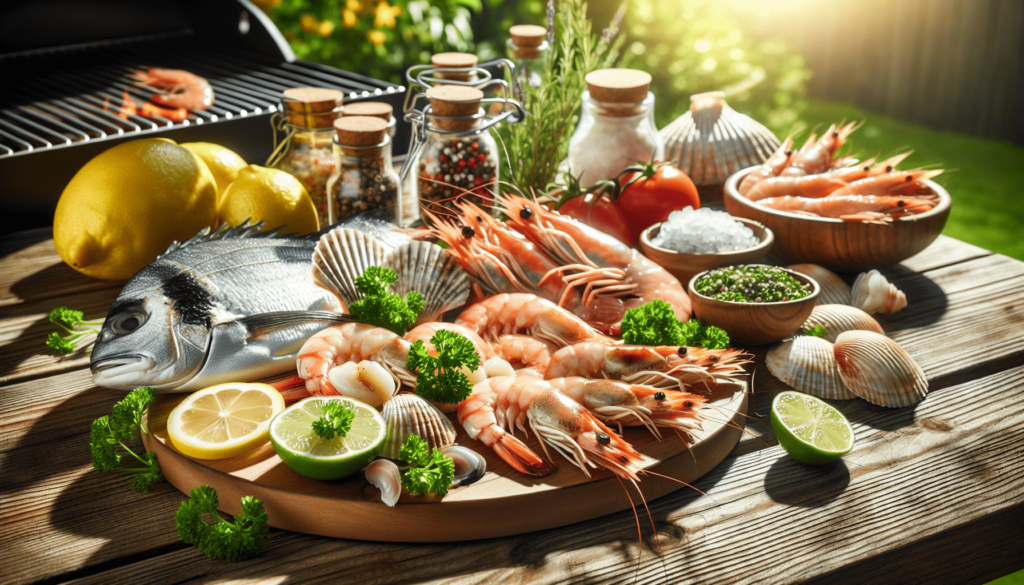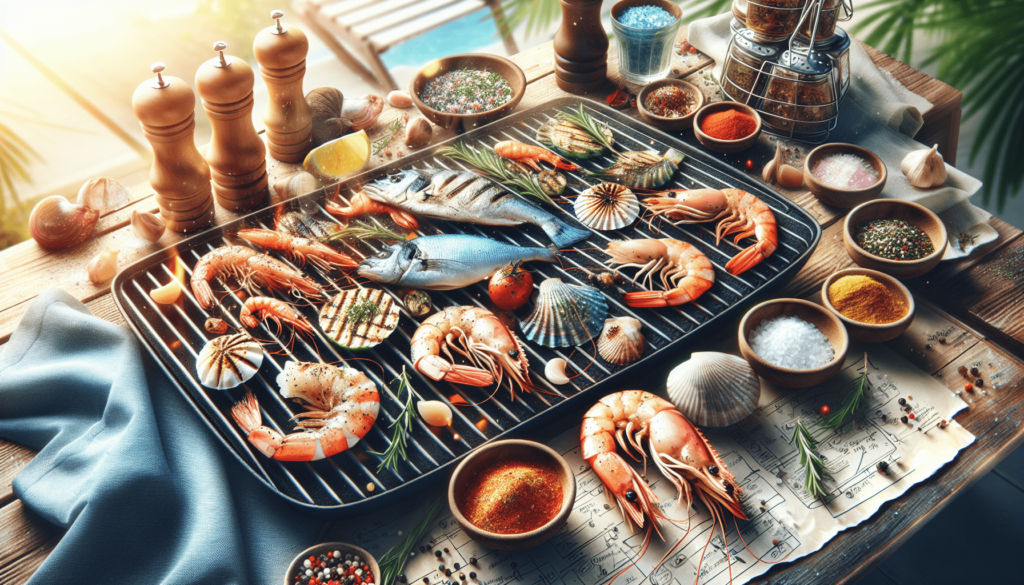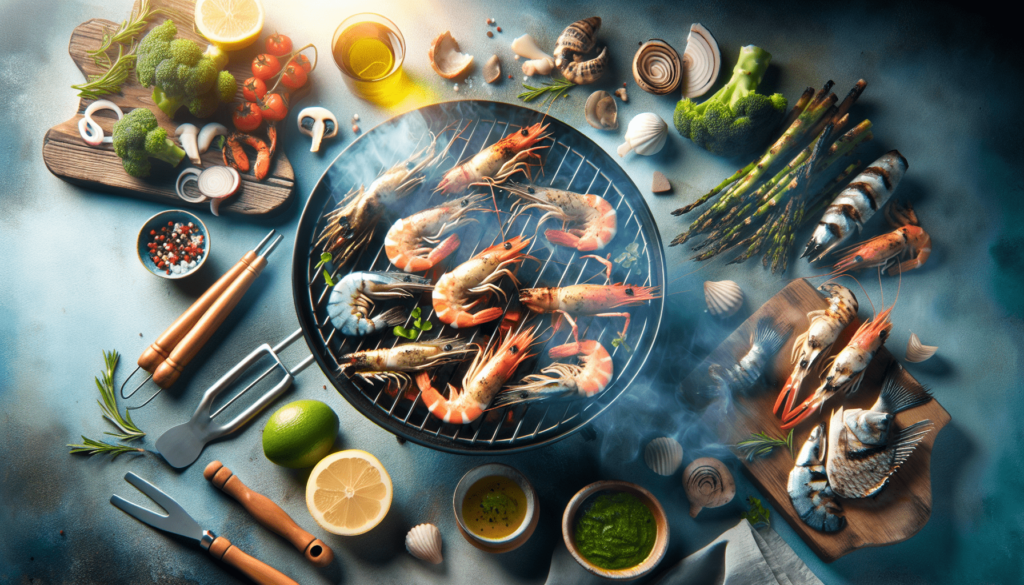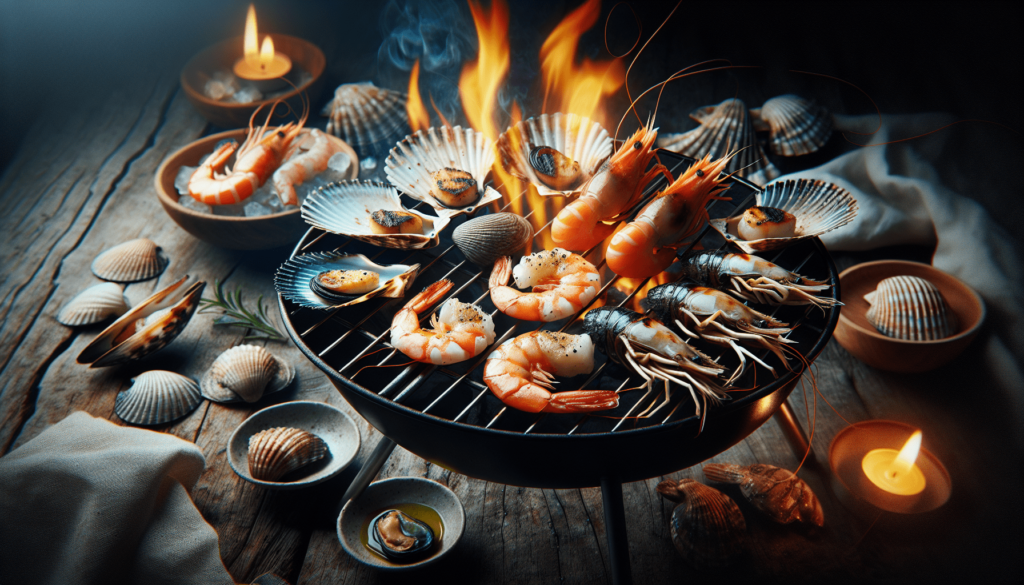When it comes to grilling delicate seafood, finding the perfect balance of flavors can sometimes be a challenge. You don’t want to overpower the natural taste of the seafood, but at the same time, a touch of seasoning can enhance its flavors. In this article, you will discover some helpful tips for lightly seasoning delicate seafood to achieve that perfect balance for your next grilling adventure.

Choosing the Right Seafood
When it comes to choosing seafood for grilling, it’s important to opt for delicate varieties that can stand up to the high heat of the grill without becoming tough or dry. Some excellent options include fish such as salmon, trout, snapper, or halibut, as well as shellfish like shrimp, scallops, or lobster. These types of seafood have a subtle flavor that can be enhanced with minimal seasoning and won’t overpower the delicate nature of the flesh.
Another crucial factor to consider when choosing seafood for grilling is freshness. Fresh seafood not only tastes better, but it also cooks more evenly and retains its moisture. When purchasing seafood, look for clear, bright eyes on fish, firm shells on shellfish, and a mild, oceanic aroma. It’s a good idea to buy from a reputable fishmonger or seafood market that has a high turnover of seafood to ensure you’re getting the freshest catch.
Size and thickness are also important considerations when selecting seafood for grilling. Opt for fillets or steaks that are about 1-1.5 inches thick, as these will cook more evenly and have a better texture. Thinner pieces may cook too quickly and become dry, while thicker pieces may take longer to cook through. By choosing seafood of the appropriate size and thickness, you can ensure that it cooks to perfection on the grill.
Preparing the Seafood
Before you start grilling your seafood, it’s crucial to clean it thoroughly. Rinse the fish or shellfish under cold running water to remove any dirt, debris, or excess scales. Pat it dry with paper towels to remove any excess moisture before seasoning and grilling. Cleaning the seafood not only ensures food safety but also helps prevent any unwanted flavors from the grill.
If you’re working with whole fish or shellfish, it’s important to remove any scales or shells before grilling. Use a knife or a specialized scaler tool to remove the scales from the fish, working from the tail towards the head. With shellfish, such as shrimp or lobster, peel off the shells and remove the vein from the back. By removing scales and shells, you’ll make it easier to enjoy your grilled seafood and reduce the risk of any unwanted textures or flavors.
While it’s important to handle seafood with care during the preparation process, it’s equally important not to overhandle it. Overhandling seafood can lead to a loss of moisture and delicate texture. When seasoning or moving the seafood, use gentle motions and avoid excessive flipping or poking. By treating your seafood with care, you’ll be rewarded with tender, flavorful results on the grill.
Minimal Seasoning Options
When it comes to seasoning delicate seafood for grilling, less is often more. Minimal seasoning options allow the natural flavors of the seafood to shine while enhancing them with complementary flavors. Here are three simple seasoning options that work well with most types of seafood:
Lemon and Herb Marinade
A classic and refreshing option, a lemon and herb marinade brings out the natural flavors of the seafood without overpowering them. Combine freshly squeezed lemon juice, minced garlic, chopped herbs like parsley or dill, a drizzle of olive oil, salt, and pepper in a bowl. Marinate the seafood for 20-30 minutes before grilling to infuse it with bright citrus notes and herbaceous aromas.
Light Citrus Vinaigrette
For a lighter and tangier option, a citrus vinaigrette can be used to lightly coat the seafood before grilling. In a bowl, whisk together citrus juices such as lemon, lime, or orange, along with a bit of olive oil, Dijon mustard, honey, salt, and pepper. Drizzle the vinaigrette over the seafood and let it sit for 10-15 minutes before grilling. The acidity of the citrus will help tenderize the seafood while adding a zesty kick.
Simple Salt and Pepper Rub
Sometimes, all you need to season delicate seafood is a simple salt and pepper rub. Combine kosher salt, freshly ground black pepper, and perhaps a hint of paprika or cayenne pepper for a subtle heat. Rub this mixture onto the seafood just before grilling and let it rest briefly so that the flavors can penetrate the flesh. This straightforward seasoning allows the natural flavors of the seafood to shine while giving it a well-rounded taste.
Using Flavored Oils
In addition to traditional seasonings, flavored oils can add an extra layer of complexity and richness to grilled seafood. These oils infuse the seafood with unique flavors that complement its natural taste. Here are a few flavorful oil options that work well with grilled seafood:
Infused Olive Oil Options
Infused olive oils, such as garlic-infused or herb-infused varieties, can add a burst of flavor to grilled seafood. Drizzle a small amount of the infused oil over the seafood before grilling, or brush it on while cooking. The subtle flavors of the infused oil will permeate the seafood, adding depth and complexity to every bite.
Subtle Sesame Oil Marinades
Sesame oil is a popular ingredient in Asian cuisine, known for its nutty aroma and rich flavor. Combine sesame oil with ingredients such as soy sauce, ginger, and garlic to create a flavorful marinade for your seafood. Brush the marinade onto the seafood before grilling and allow it to infuse for 15-20 minutes. The sesame oil will add a distinct and enticing flavor to your grilled seafood.
Chili-Infused Oils for a Kick
If you enjoy a bit of heat, chili-infused oils can provide the perfect kick to grilled seafood. Available in various spice levels, from mild to fiery, chili-infused oils can be brushed onto the seafood before grilling or used as a dipping sauce. The heat from the chili will add a bold and exciting element to the delicate flavors of the seafood.

Enhancing with Herbs and Spices
In addition to oils and marinades, herbs and spices can be used to enhance the flavor of grilled seafood. These simple additions can elevate the taste of the seafood without overpowering its delicate nature. Here are a few popular options:
Sprigs of Fresh Dill or Thyme
Fresh herbs, such as dill or thyme, can add a lovely aroma and subtle flavor to grilled seafood. Place a few sprigs of your chosen herb on top of the seafood while grilling to infuse it with their essence. The heat of the grill will release the fragrant oils from the herbs, enhancing the overall taste of the seafood.
Dusting of Paprika or Cayenne Pepper
For those who enjoy a bit of spice, a dusting of paprika or cayenne pepper can add a touch of heat to grilled seafood. Sprinkle a small amount on the seafood just before grilling to give it a flavorful kick. The smoky sweetness of paprika or the fiery heat of cayenne pepper will enhance the taste of the seafood without overpowering it.
Sliced Garlic or Shallots
Garlic and shallots are aromatic additions that can bring depth and flavor to grilled seafood. Thinly slice garlic or shallots and place them on top of the seafood while grilling. As they cook, they will soften and release their natural oils, enhancing the taste of the seafood with their savory notes. The slight caramelization of the garlic or shallots will add a rich and satisfying element to the grilled seafood.
Avoiding Overpowering Ingredients
While it’s important to enhance the flavor of grilled seafood, it’s equally important not to overpower its delicate nature. Here are a few tips to avoid using ingredients that may overwhelm the natural taste of the seafood:
Reduce the Amount of Seasoning Used
One of the simplest ways to avoid overpowering grilled seafood is to reduce the amount of seasoning used. By using a light hand with seasoning, you allow the natural flavors of the seafood to shine through. Remember, seafood is delicate, and a little seasoning can go a long way.
Steer Clear of Strong Spices like Cumin or Curry
While strong spices like cumin or curry can add depth and intensity to certain dishes, they can overpower the delicate flavors of grilled seafood. It’s best to avoid using these spices when grilling seafood and instead opt for milder seasonings that enhance rather than dominate its taste.
Avoid Heavy Sauces or Marinades
Heavy sauces or marinades can weigh down grilled seafood and mask its delicate flavors. It’s best to choose lighter options that complement the seafood rather than drown it in heavy sauces. You want the flavors of the seafood to be the star of the meal, so use sauces sparingly or opt for lighter alternatives.

Grilling Techniques
Grilling seafood can be a delicate process that requires attention and finesse. By following a few key techniques, you can ensure that your seafood is cooked to perfection and retains its moisture and tenderness. Here are some grilling tips to keep in mind:
Use a Clean and Well-Oiled Grill Grate
Before grilling your seafood, make sure to clean the grill grates thoroughly. Remove any leftover residue from previous grilling sessions to prevent any unwanted flavors from transferring to your seafood. After cleaning, brush the grates with oil to create a non-stick surface that will prevent the seafood from sticking and ensure even cooking.
Preheat the Grill to Medium-High Heat
Proper preheating is essential for achieving a consistent and flavorful result when grilling seafood. Preheat your grill to medium-high heat to ensure that it reaches the optimal temperature for cooking seafood. This will help to sear the outside of the seafood quickly, sealing in its natural juices and flavors.
Be Cautious of Cooking Time to Prevent Overcooking
Seafood cooks quickly, and it’s important to keep a close eye on the cooking time to prevent overcooking. Fish generally takes about 8-10 minutes per inch of thickness to cook through, while shrimp and scallops only require a few minutes on each side. Remember that seafood will continue to cook for a short period after being removed from the grill, so it’s best to take it off just before it’s fully cooked to avoid any dryness.
Maintaining Moisture and Tenderness
One challenge when grilling seafood is keeping it moist and tender. The high heat of the grill can quickly dry out delicate seafood if not properly attended to. Here are a few techniques to help maintain moisture and tenderness:
Basting with Butter or Oil
To keep your seafood moist and flavorful, consider basting it with butter or oil while grilling. This will not only add richness to the seafood but also create a protective barrier to prevent it from drying out. Using a brush, apply the butter or oil every few minutes to keep the seafood moist and impart a delicious flavor.
Wrap in Foil to Retain Moisture
Another way to lock in moisture when grilling seafood is to wrap it in foil. This method is especially effective for delicate fish fillets or shellfish. Place the seasoned seafood in a foil packet and fold the edges to seal it tightly. The seafood will steam inside the packet, resulting in a moist and tender final product.
Cook Seafood with its Skin On
When grilling fish, it’s often best to leave the skin on as it acts as a natural protective layer. The skin helps to retain moisture and prevent the fish from sticking to the grill grates. Once the fish is cooked, the skin can easily be removed, leaving behind a tender and flavorful fillet.

Proper Grilling Equipment
Having the right grilling equipment can make a significant difference in the outcome of your grilled seafood. Here are a few essential tools to consider:
Utilize a Fish-Specific Grilling Basket
To prevent delicate seafood from falling apart while grilling, consider using a fish-specific grilling basket. These baskets hold the seafood securely, allowing you to flip it without any risk of it breaking apart. The basket also ensures that the seafood cooks evenly and doesn’t stick to the grill grates.
Invest in a Quality Grill Thermometer
A quality grill thermometer is a valuable tool for grilling seafood to perfection. It allows you to accurately monitor the internal temperature of the seafood, ensuring that it’s cooked to the desired level of doneness. This is particularly important with fish, as overcooking can quickly lead to dry and tough results.
Use Long-Handled Tongs or Spatulas
When grilling seafood, it’s important to have the right tools for handling and flipping it. Long-handled tongs or spatulas are ideal for turning delicate fish fillets or shellfish without causing any damage. These tools allow you to handle the seafood with precision and ease, ensuring that it remains intact during the grilling process.
Serving Suggestions
After successfully grilling your seafood to perfection, it’s time to decide how to serve it. Here are a few serving suggestions to complement your grilled seafood:
Garnish with Fresh Lemon or Lime Wedges
A simple and classic way to enhance the flavors of grilled seafood is to serve it with fresh lemon or lime wedges. The tangy citrus juices can be squeezed over the seafood just before eating, adding a burst of acidity that brightens the taste. The citrus also complements the natural flavors of the seafood, creating a well-rounded and refreshing dish.
Pair with a Light Salad or Steamed Vegetables
Grilled seafood pairs wonderfully with a light salad or steamed vegetables. The crispness and freshness of a salad or the tender texture of steamed vegetables provide a pleasing contrast to the smoky and flavorful seafood. Consider serving your grilled seafood alongside a vibrant green salad or a medley of grilled or steamed vegetables for a well-balanced and satisfying meal.
Serve with a Side of Aioli or Tartar Sauce
Creamy sauces, such as aioli or tartar sauce, can elevate the taste of grilled seafood. The rich and tangy flavors of these sauces provide a delicious accompaniment to the delicate seafood. Whether you prefer a garlicky aioli or a zesty tartar sauce, serving it on the side allows each diner to customize their seafood experience to their liking.
In conclusion, grilling delicate seafood requires careful selection, preparation, seasoning, and cooking techniques. By opting for delicate seafood varieties, ensuring freshness, and considering the size and thickness of the seafood, you can set the stage for a flavorful grilled seafood feast. Cleaning the seafood thoroughly, removing scales or shells, and avoiding overhandling are critical steps to prepare the seafood for grilling.
When seasoning delicate seafood, minimal seasoning options such as lemon and herb marinades, light citrus vinaigrettes, or simple salt and pepper rubs are recommended to enhance the natural flavors. Flavored oils, like infused olive oils, subtle sesame oil marinades, or chili-infused oils, can be used to add extra complexity. Additionally, herbs and spices like fresh dill or thyme, paprika or cayenne pepper, and sliced garlic or shallots can further enhance the taste of grilled seafood.
To avoid overpowering the delicate nature of the seafood, it’s important to reduce the amount of seasoning used, steer clear of strong spices, and avoid heavy sauces or marinades. Proper grilling techniques, such as using a clean and well-oiled grill grate, preheating the grill to medium-high heat, and monitoring cooking time, can ensure optimal results. Basting with butter or oil, wrapping the seafood in foil, and leaving the skin on can help maintain moisture and tenderness during grilling.
Investing in proper grilling equipment, such as fish-specific grilling baskets, quality grill thermometers, and long-handled tongs or spatulas, will aid in achieving the best outcome. Finally, serving suggestions such as garnishing with fresh lemon or lime wedges, pairing with a light salad or steamed vegetables, or serving with a side of aioli or tartar sauce can complement the grilled seafood and enhance the dining experience.
With these tips and techniques in mind, you are now well-equipped to choose, prepare, season, and grill delicate seafood to perfection. So fire up the grill, invite your friends and family, and enjoy a delicious seafood feast that will leave everyone wanting more. Happy grilling!
